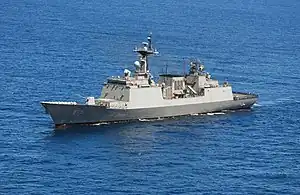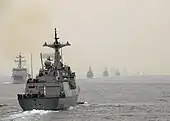Chungmugong Yi Sun-sin-class destroyer
Chungmugong Yi Sun-sin class destroyers (Korean: 충무공 이순신급 구축함, Hanja: 忠武公李舜臣級驅逐艦) are multipurpose destroyers of the Republic of Korea Navy. The lead ship of this class, ROKS Chungmugong Yi Sunsin, was launched in May 2002 and commissioned in December 2003. Chungmugong Yi Sun-sin-class destroyers were the second class of ships to be produced in the Republic of Korea Navy's destroyer mass-production program named Korean Destroyer eXperimental, which paved the way for the navy to become a blue-water navy. Six ships were launched by Hyundai Heavy Industries and Daewoo Shipbuilding & Marine Engineering in four years.
 ROKS Yi SunSin (DDH-975) | |
| Class overview | |
|---|---|
| Builders | |
| Operators | |
| Preceded by | Gwanggaeto the Great class |
| Succeeded by | Sejong the Great class |
| In commission | 2003– |
| Active | 6 |
| General characteristics | |
| Type | Guided-missile destroyer |
| Displacement |
|
| Length | 150 m (492 ft 2 in) |
| Beam | 17.4 m (57 ft 1 in) |
| Draft | 9.5 m (31 ft 2 in) |
| Propulsion | Hanhwa GE LM2500 , Doosan MTU 956 Combined diesel or gas |
| Speed | 30 knots (56 km/h; 35 mph) |
| Complement | 300 |
| Armament |
|
| Aircraft carried | 2 × Super Lynx helicopters |
| Notes | Wang Geon is currently (April 2015) acting in a NEO/Temporary diplomatic mission role on station off the coast of Yemen. She was originally in the area as part of the Cheonghae Unit rotation. |
Weapon systems
The ships have a 32-cell strike-length Mk 41 VLS for SM-2 Block IIIA area-air defence missiles, one 21-round RAM inner-layer defence missile launcher, one 30 mm Goalkeeper close-in weapon system, one Mk 45 Mod 4 127 mm gun, eight Harpoon anti-ship missiles and two triple 324 mm anti-submarine torpedo tubes.
The electronics suite includes one Raytheon AN/SPS-49(V)5 2D long-range radar (LRR), one Thales Nederland MW08 target indication 3D radar (TIR), two Thales Nederland STIR240 fire-control radars with OT-134A Continuous Wave Illumination (CWI) transmitters, an SLQ-200(V)K SONATA electronic warfare system and a KDCOM-II combat management system which is derived from the Royal Navy Type 23 frigate's SSCS combat management system. BAE Systems WDS Mk 14 originally developed for the US Navy's New Threat Upgrade evaluates threats, prioritizes them, and engages them in order with SM-2.
On the 4th unit, ROKS Wang Geon, the 32-cell Mk 41 VLS is moved to the left and an indigenous VLS named K-VLS is installed on the right. The ship's forward part is spacious enough to take a 56-cell Mk 41 VLS.
Design
The KDX-II is part of a much larger build up program aimed at turning the ROKN into a blue-water navy. It is said to be the first stealthy major combatant in the ROKN and was designed to significantly increase the ROKN's capabilities.[1]
Ships in the class
| Name | Pennant number | Builder | Launched | Commissioned | Status |
|---|---|---|---|---|---|
| ROKS Chungmugong Yi Sun-sin | DDH-975 | Daewoo Shipbuilding & Marine Engineering | 15 May 2002 | 30 November 2003 | Active |
| ROKS Munmu the Great | DDH-976 | Hyundai Heavy Industries | 11 April 2003 | 30 September 2004 | Active |
| ROKS Dae Jo-yeong | DDH-977 | Daewoo Shipbuilding & Marine Engineering | 12 November 2003 | 30 June 2005 | Active |
| ROKS Wang Geon | DDH-978 | Hyundai Heavy Industries | 4 May 2005 | 10 November 2006 | Active |
| ROKS Gang Gam-chan | DDH-979 | Daewoo Shipbuilding & Marine Engineering | 16 March 2006 | 1 October 2007 | Active |
| ROKS Choe Yeong | DDH-981 | Hyundai Heavy Industries | 20 October 2006 | 4 September 2008 | Active |
Gallery
- Chungmugong Yi Sun-sin-class Gallery
.jpg.webp) ROKS Munmu the Great (DDH-976) during RIMPAC 2006
ROKS Munmu the Great (DDH-976) during RIMPAC 2006.jpg.webp) ROKS Dae Jo Yeong (DDH-977) being guided into Naval Base San Diego
ROKS Dae Jo Yeong (DDH-977) being guided into Naval Base San Diego ROKS Kang Gamchan (DDH-979) during International Fleet Review
ROKS Kang Gamchan (DDH-979) during International Fleet Review_cropped.jpg.webp) ROKS Choi Young (DDH-981) during joint exercise "Invincible Spirit"
ROKS Choi Young (DDH-981) during joint exercise "Invincible Spirit"
Variants
KDX-IIA
KDX-IIA is a proposed variant of the KDX-II. It will be armed with the advanced Aegis Combat System and will have enhanced features of KDX-II such as stealth. The ship has been offered to the Indian Navy.[2]
Arsenal ship
On August 14, 2019, the Ministry of National Defense unveiled a five year defense plan between 2020 and 2024. The defense plan called for two new naval projects to be developed: the LPX-II-Class Aircraft Carrier and an arsenal ship. The design of the arsenal ship is said to be based on the KDX-II destroyer and is expected to be completed by the late 2020s.[3]
See also
References
- ROK Navy
- BEMIL. "이지스 KDX-2, 과연 수출될수 있을까?".
- Vavasseur, Xavier (20 August 2019). "ROK Navy To Get Aircraft Carrier, Arsenal Ship As Part Of Ambitious 5-Year Defense Plan". Naval News. Retrieved 20 March 2021.
Further reading
- Watts, Anthony J. (2006). Jane's Warship Recognition Guide (4 ed.). London: HarperCollins. ISBN 978-0-06-084992-4. OCLC 63185682.